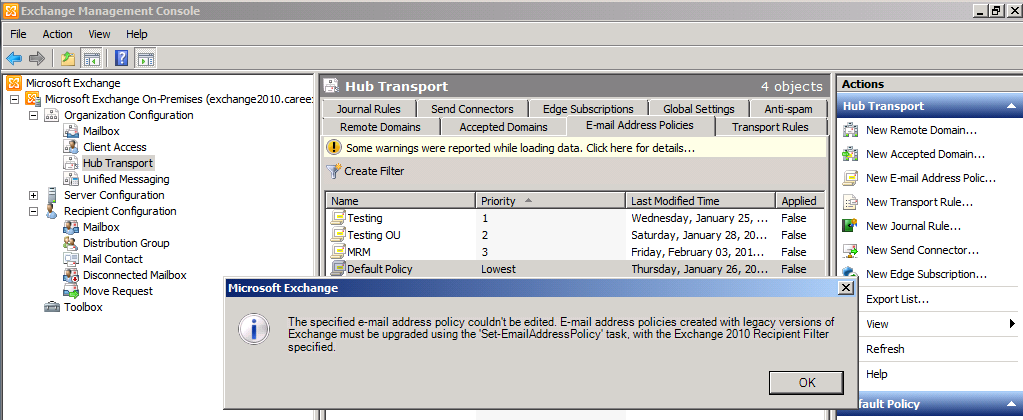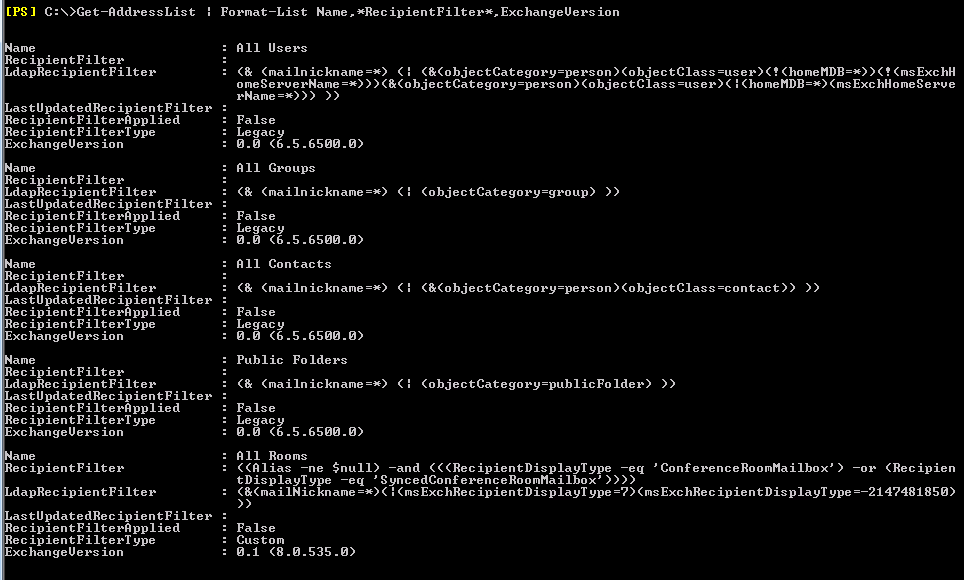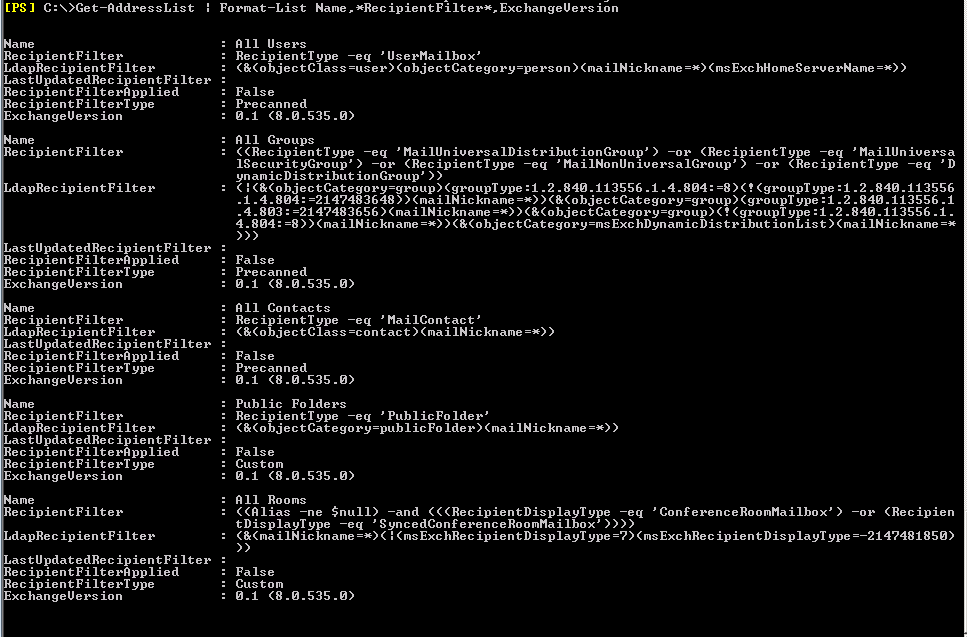Exchange 2003 and the way Exchange 2010 work differently when they handle Address lists and Email Address Policies
Exchange 2010 does not support the LDAP filters anymore
The LDAP filters must be converted to OPATH filters
If you have custom LDAP filters implemented to configure Address Lists make sure that you convert them to OPATH filters as well.
This Upgrade has to be done using ExchangeManagement Shell.
First we can learn how to identity legacy versions of Email address Policies and Address lists.
If you Try to Edit your Email Address Policies , It will Show up an Error Showing they are Legacy Versions

You can Use Exchange management Shell to Check it.
Get-EmailAddressPolicy | Format-List name,*RecipientFilter*,ExchangeVersion
It will Show up as Legacy .

Or
You can run
Get-EmailAddressPolicy | where {$_.RecipientFilterType -eq "Legacy"}
You can Run Set-Emailaddresspolicy to upgrade the Default Email Address Policy
Set-EmailAddressPolicy "Default Policy" -IncludedRecipients AllRecipients

Now your Upgraded Email Address Policy will show as precanned

You can Run the command below to identify the legacy versions of Address lists
Get-AddressList | Format-List Name,*RecipientFilter*,ExchangeVersion

You can Run the command below to identify the legacy versions of Global Address lists
Get-GlobalAddressList | Format-List Name,*RecipientFilter*,ExchangeVersion

Now You can Run these commands to Upgrade your Address lists and Global Address list.
Set-AddressList "All Contacts" -IncludedRecipients MailContacts
Set-AddressList "All Groups" -IncludedRecipients MailGroups
Set-AddressList "All Users" -IncludedRecipients MailboxUsers
Set-AddressList "Public Folders" -RecipientFilter { RecipientType -eq 'PublicFolder' }Set-GlobalAddressList "Default Global Address List" -RecipientFilter {(Alias -ne $null -and (ObjectClass -eq 'user' -or ObjectClass -eq 'contact' -or ObjectClass -eq 'msExchSystemMailbox' -or ObjectClass -eq 'msExchDynamicDistributionList' -or ObjectClass -eq 'group' -or ObjectClass -eq 'publicFolder'))}——————————————————-
Now you can Run
Get-AddressList | Format-List Name,*RecipientFilter*,ExchangeVersion
to Verify it has been upgraded

Now you can Run
Get-GlobalAddressList | Format-List Name,*RecipientFilter*,ExchangeVersion
to Verify it has been upgraded

If you have Customer LDAP filters the blog would help you to understand things even more better.
Great !!
You learn How to Upgrade Email Address Polices and Address lists from Exchange 2003 to Exchange 2010


I do believe all the concepts you have offered for your post. They are very convincing and will certainly work. Nonetheless, the posts are too short for starters. May you please lengthen them a little from subsequent time? Thank you for the post.
Its Pleasure to understand careexchange.in . The above articles is pretty extraordinary, and I really enjoyed reading your blog and points that you expressed. I really like to appear back over a typical basis,post a lot more within the topic. Thanks for sharing…keep writing!!!
I just want to tell you that I am all new to blogging and truly liked you’re web site. Probably I’m want to bookmark your blog . You amazingly come with tremendous articles and reviews. Cheers for sharing your blog.
Well said. Thanks so much!
It really is nice to definitely generate a site the location where the blogger is intelligent. Thanks for creating your internet site.
Thank you!! all the best!
Your are welcome !
Good day dude,
I have a quick question for you in this, I have a default email address policy and that has 3 formats of e-mail address displaying option.
Example:
Nel.Nat@gmail.com
nel.n@gmail.com
n.nat@gmail.com
—————————————-
While i create an user object it automatically took Nel.Nat@gmail.com. post applying default policy.
Now i changed to n.nat@gmail.com and question is here
> will this impact anything?
>do i have to uncheck the option that says automatically update the e-mail address policy after the changes i made?
————————————-
Please call up have more questions as well…
Hi Nelson,
Changing this will affect the mailflow. Where the external recipient will send Emails to your Old alias .
If its a new box. and new mailboxes. Then never worry about it.
Unchecking Update from EAP is not a good option,
It will be hecting to manage things in the future.
hope i have answered your question
The command for the Public Folder conversion does not work, gives invalid syntax error. After searching for a bit, found the correct syntax to be:
Set-AddressList “Public Folders” -RecipientFilter { RecipientType -eq ‘PublicFolder’ }
(see this page: http://technet.microsoft.com/en-us/library/dd335105(v=exchg.141).aspx)
The command for the Default Global Address List upgrade was producing a syntax error as well, and the same Technet page has the correct command:
Set-GlobalAddressList “Default Global Address List” -RecipientFilter {(Alias -ne $null -and (ObjectClass -eq ‘user’ -or ObjectClass -eq ‘contact’ -or ObjectClass -eq ‘msExchSystemMailbox’ -or ObjectClass -eq ‘msExchDynamicDistributionList’ -or ObjectClass -eq ‘group’ -or ObjectClass -eq ‘publicFolder’))}
The only difference I can spot between the command on this page and the one from Technet is the single quotes you used are different from the ones Technet uses (` vs. ‘)
Here is the syntax error I kept getting with your command:
Invoke-Command : Cannot bind parameter ‘RecipientFilter’ to the target. Exception setting “RecipientFilter”: “Invalid f
ilter syntax. For a description of the filter parameter syntax see the command help.
“(Alias -ne $null -and (ObjectClass -eq `user’ -or ObjectClass -eq `contact’ -or ObjectClass -eq `msExchSystemMailbox’
-or ObjectClass -eq `msExchDynamicDistributionList’ -or ObjectClass -eq `group’ -or ObjectClass -eq `publicFolder’))” a
t position 40.”
At C:\Users\xx\AppData\Roaming\Microsoft\Exchange\RemotePowerShell\xxxx-exchange1.xxxx.loc\xxxx-exchange1.xxxx.loc.psm1
:46869 char:29
+ $scriptCmd = { & <<<< $script:InvokeCommand `
+ CategoryInfo : WriteError: (:) [Set-GlobalAddressList], ParameterBindingException
+ FullyQualifiedErrorId : ParameterBindingFailed,Microsoft.Exchange.Management.SystemConfigurationTasks.SetGlobalA
ddressList
(I obfuscated the client name in the command and path)
Thank you for this great article!
Corrected Bart , Thank you and you are always welcome !
Hi Satheshwaran,
I’m having the same issue as Bart with the Public Folder script.
I tried copying and pasting the command from the other article as well.
Am I missing something?
Appreciate your help.
Open the Technet link posted – Copy from that page. that should help . WordPress issue i guess
Sathesh,
Thanks for the great article! When is a good time or best practice to update the GAL and Address Lists during a transition from Exchange 2003 to Exchange 2010? I have the new exchange 2010 setup all configured. All mailboxes are currently on ex2003 and i am ready to do the mailbox migration to the new server…
I would like to know if updating the GAL and Address list now a good idea or wait till all mailboxes has been moved over? Any recommendations? Pro/cons?
If your Email address Policy is set correctly .
You can Update it anytime Kumar.
Everything going to look fine.
I have never seen problems in Updating GAL . So don’t worry.
Hi Sathesh,
I’m having the same issue as Bart with the Public Folder script.
I tried copying and pasting the command from the other article as well.
Am I missing something?
Appreciate your help.
Hi Satheswaran,
Thanks for the posting. I was rtying to upgrade my email address policy through this steps. But I got error in EMS telling that “The recipient policy “default policy” with mailbox manager settings cannot be managed by the current version of EMC. Pls use a management console with the same version as the object. I was trying in in exchange 2010 server. any guidance?
Open 2003 . Edit recipient policy . U will see mailbox manager setting . Un check it . Then upgrade . Old type of mrm .
Hi,
We only have one recipient filter,
When I run the get command i get,
Name : Default Policy
RecipientFilter :
LdapRecipientFilter : (mailnickname=*)
LastUpdatedRecipientFilter :
RecipientFilterApplied : False
RecipientFilterType : Legacy
ExchangeVersion : 0.0 (6.5.6500.0)
Can you tell me if we are safe to upgrade this without problem?
Thanks,
Steve
Looks safe !
Set-GlobalAddressList “Default Global Address List” -RecipientFilter {(Alias -ne $null -and (ObjectClass -eq ‘user’ -or ObjectClass -eq ‘contact’ -or ObjectClass -eq ‘msExchSystemMailbox’ -or ObjectClass -eq ‘msExchDynamicDistributionList’ -or ObjectClass -eq ‘group’ -or ObjectClass -eq ‘publicFolder’))}
This cmd is not working and giving me an error:
Cannot bind parameter ‘RecipientFilter’ to the target. Exception setting “RecipientFilter”: “Invalid f
ilter syntax. For a description of the filter parameter syntax see the command help.
“(Alias -ne $null -and (ObjectClass ………………….Anyone has the solution or FIX?
Please type it manually. Format error.
hi, help mi please , how create adress list manual exchange 2013 no domain ?
Use New-addresslist